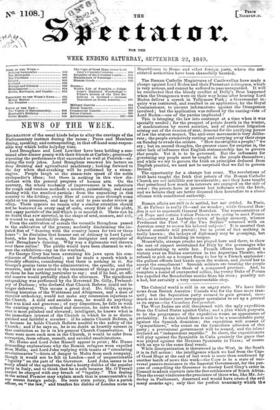NEWS OF THE WEEK.
Itscitas.Trow of the usual kinds helps to allay the cravings of the Parliamentary instinct during the recess ; Peers and Members dining, speaking, and corresponding, in that off-hand semi-respon- sible way which befits holyday time. Lord Brougham and Lord Lowther have been holding a sus- tained after-dinner gossip with their friends at Carlisle; graciously repeating the performance that succeeded so well at Pennth—en- coring the very jokes. Lord Brougham renewed his lecture on deep draining and agricultural machinery; _looking forward to the day when &id-crushing will be performed by a steam- engine. People laugh at the steam-rate speed of the noble cycloptedist's ideas; but there is nothing in this view dis- cordant with the general progress of human arts. On the contrary, the, :whole tendency of improvement is to substitute for rough and random methods a minute, painstaking, and exact dealing with the smallest particle : from the unpacking in thie country to the folding, every fibre of cotton goes through some eight or ten processes, and may be said to pass under review as
ofteu, There appears no reason why a similar attention shoeld net be bestowed on every Seed bt‘eorn, every fibre of the plant, and eery particle of the actilethich is to nourish it. There can be no doubt that raw material, in the shape of seed, manure, and soil, is wasted to an incalculable degree.
From the cultivation of cereals the versatile Brougham passed to the cultivation of the graces; modestly disclaiming the im- puted feat of "dancing with the country lasses for two or three hours ": he disclaims that honour out of delicacy to Lord Lynd- hurst, who has been, it seems, the instigator and emulator of Lord Brougham's dancing. Why was a diplomatic veil thrown over these sallies? The public would have been charmed to wit- ness the exhibition---say on the woolsack. Sir George Grey has been exercising his jaws upon his con- stituents of Northumberland ; and he made a speech which is tolerably effective, considering that there is nothing in it. Sir George's genius turns to the administrative, the specific, and the concrete, and is not suited to the treatment of things in general : on them he has nothing particular to say ; and if he had, an offi- cial reserve would probably check the utterance. The significant outspeaking was performed by the Reverend Dr. Gilly, Prebend- ary of Durham ; who declared that Church Reform could not be longer deferred. This means a great deal. Dr. Gilly, sympa- thizing historian of the Waldenses and Albigenses, and a man of superior orthodoxy, would not make any concession injurious to the Church. A mild and amiable man, he would do anything that was kind and generous ; of easy disposition, he falls in with ,the existing system ; refined and decorous, he sides with what- ever is most polished and elevated ; intelligent, he knows what is the immediate interest of the Church in which he is so distin- guished and faithful a member : if he admits Church Reform, it IS because he holds Church Reform needful to the safety of the Church ; and if he says so, he is no doubt as heartily earnest in that conviction as he is in his general Church Conservatism. If there were more such men in the Church, it would be safer from corruption, from odium, assault, and suicidal recalcitrations. Mr. Hume and Lord John Russell appear in print ; Mr. Hume demanding explanations why the Roman refugees were expelled from Malta; and Lord John replying with taunts at "circulating revolutionaries "—hints, of danger to Malta from such company, though it would not be felt in London—and of unquestionable "legality" on the part of the Governor. Lord John seems to be really afraid of the agitators, to feel a hearty dislike of the popular party in Italy, and to think that he is safe because Mr. O'Ferrall cannot be charged with any breach of "legality." This feeling in the actual Premier may explain much that is unaccountable in our recent foreign policy. He rests state policy, like a parish officer, on "the law," and treaters his dislike of London mobs to
Republicans in Rome and other foreign parts, where the con- stituted authorities have been shamefully bearded.


























